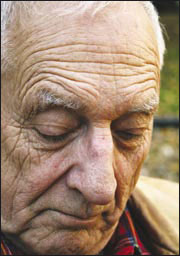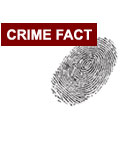Elder Abuse, While Widely Undetected, Steadily Increasing
| By TEALE CALIENDO, Correspondent |
“I have a case right now where you’d shake your head,” said John DeMattia of Connecticut’s Elder Abuse Unit. “I have a daughter physically abusing her mother… it got to the point of broken ribs, broken nose…and (now) the mother calls me once a week begging me not to ask for jail time for her daughter because she needs her to take care of her.”
DeMattia is a supervisory assistant in the State’s Attorney’s Elder Abuse Unit, which was established in 2000 to investigate and prosecute crimes against the elderly (victims 60 years and older). The unit’s employees are trained to handle this special category of victims and victimizers because of the vital role “family dynamics” plays in the problem.
 There has been a steady increase in the reporting of domestic elder abuse – abuse occurring in the homes where the elderly reside – according to the National Center on Elder Abuse (NCEA). Nearly 566,000 reports of elder abuse were made nationally in 2003 (the most recent year for which statistics are available), 20 percent more than in 2000. It’s projected the problem will only escalate with the graying of our population, but accurate statistics are elusive for a variety of reasons.
There has been a steady increase in the reporting of domestic elder abuse – abuse occurring in the homes where the elderly reside – according to the National Center on Elder Abuse (NCEA). Nearly 566,000 reports of elder abuse were made nationally in 2003 (the most recent year for which statistics are available), 20 percent more than in 2000. It’s projected the problem will only escalate with the graying of our population, but accurate statistics are elusive for a variety of reasons.
“The average age for living now is around 80, and the fastest-growing segment of the population is 85 and above,” says Alice Deak, director of Information Services for the Southwestern Connecticut Agency on Aging.
“There are many 90-year-olds living in the community who don’t go into nursing homes …they stay in their own apartments or in assisted living facilities.”
The NCEA says the numbers of abuse cases we know about is just the tip of the iceberg. It is estimated only one in 14 cases of neglect and one in 25 cases of financial abuse are reported.
While the state enforcement unit has 55-60 open cases and at least that many more under review, an accurate account of cases in Connecticut is not possible because some are prosecuted by local jurisdictions and not reported to DeMattia’s office. Since 2000, the unit has averaged about 48 cases a year, and about 90 percent of them have been financial exploitation. The financial loss has skyrocketed to approximately $250,000 but the unit now only accepts cases where the loss is $500,000 or more, with some exceptions.
"As the first of the baby boomers hit the age of seniority in Connecticut (60), we expect that unfortunately thenumber of elder abuse crimes will only increase," DeMattia observed.
DeMattia says the course of elder abuse gets progressively worse, and if discovered, the elder usually tries to shield the abuser from punishment. It is not only because the victim fears the abuser; shame and guilt also play into the reluctance to admit what’s going on. It sometimes follows a lifelong pattern of protecting the abuser, who is usually a child or family member.
“The saddest part is, the son rips off the mom and the mom ends up broke. She is now forced to move in with the son…and that can escalate to physical abuse,” explained DeMattia.
“Sadly…about 75 percent of the time it’s a family member and usually involves embezzlement,”
DeMattia said. “They have power of attorney or conservatorship and they end up taking the money for their own use…leaving the parents destitute. It’s almost insulting because it tends to be people in my age bracket, 45, and they tell me, ‘I didn’t steal the money…my parents are leaving it to me in their will, and it’s mine.’ They justify it as their inheritance.”
DeMattia says he’s heard that excuse so often his department coined the phrase, "accelerated inheritance."
“And, they will literally look at you and say, ‘That’s my money. My mom said I could use it.’ I say, ‘Yes, maybe to take fifty dollars or so…not to re-mortgage her house twice and lose it.’ The victims,” DeMattia says, “end up on Title 19, which means the taxpayers subsidize them, or in a nursing home, or living hand-to-mouth.”
Such financial and emotional devastation also impacts an elder’s physical health. Victims often make themselves physically ill after being robbed and wind up in a nursing home to live out their last years.
DeMattia decries what he sees as a change in our society in which we isolate or warehouse seniors. “When I grew up we were in neighborhoods where everyone knew everyone else and everyone helped everyone else. If someone got laid off you brought food over…you got your kids looked after. (But) as everyone became more affluent, no one wanted to know anything. It’s all about privacy. We don’t want to have grandma and grandpa and uncles living with us. We want to do our own thing so we end up putting them in assisted living or a nursing home. And everyone feels like they are heroes when they call mom or dad or grandma or grandpa for 15 minutes.”
DeMattia says this isolation makes elders easy targets for stranger predators. “When you are looking forward to a telemarketing call because you don’t have any relatives or nieces or nephews or sons or daughters calling you, it’s pretty sad. These people end up being the victims with whom I work because their own families aren’t paying attention to them or the people that are out there preying on the seniors.” DeMattia adds, “(Some) seniors are on an island and when they get abused they don’t know where to turn or what to do.”
Deak says keeping the elderly connected to society is vital. “There’s a whole variety of services
out there to assist the person from being isolated,” she explains. “When people are at risk in the community, and that could include being quite frail or having mobility impairments,
there are programs that can assist people in their homes. One of them is the Connecticut Home Care Program for Elders. If the person is eligible, a case manager can go out and do an assessment with the individual and/or with the family…(about) what kinds of services are needed.”
In addition, Deak notes, senior centers are focal points in many communities, meals on wheels are offered, churches minister to the elderly, and in many communities adult daycare is also an option.
DeMattia’s responsibilities include educating the elderly about those services, so he regularly addresses senior groups across the state.
“They respond,” he says. “You see in their eyes how appreciative they are that someone is paying attention. I think a lot have the feeling that they are forgotten, and we get a lot of satisfaction
in our job because we get to help.”
But most often that help comes too late to salvage the elders' savings.
“We’ve arrested a lot of people who have gone to jail," DeMattia says. “But I can count on one hand the times we’ve gotten their money back. By the time my department gets involved, the money is gone. Even if the guilty party goes to jail, I’d much prefer getting the money back, so (the elder) doesn’t have to worry about paying the rent or getting medicine. All I can do is put the person in jail. Then they come out, end up on probation, and pay $50 or $100 a month back to the victim for five years" – not much help to those at the end of their lives.
DeMattia says an alert public can help intervene in cases before it’s too late.
“You know how everyone fears the nosy neighbor? Well, I like the nosy neighbor. Someone looking out his or her window sees something. We’ve developed cases from situations
like that,” he says. In addition, as with child abuse and neglect, there is a list of mandated reporters for elder abuse, including doctors, nurses, nursing home staff, patient advocates, and clergy.
DeMattia loves his work, because he can see the difference it makes in the lives of seniors. “It’s the best job I could do because of the group we serve. We in this department get a lot of satisfaction knowing that we get to help.”
If you suspect domestic elder abuse in Connecticut, call 1-888-385-4225; from out-of-state, call 1-800-203-1234.
If you suspect abuse in a nursing home, residential facility, or assisted living community, contact Connecticut’s Long Term Care Ombudsman Program at 1-866-388-1888. If you would like information concerning services and programs to assist seniors and their families, call your local Area Agency on Aging at 1-800-994-9422.
Contact the author at t.caliendo@thejusticejournal.com
|






